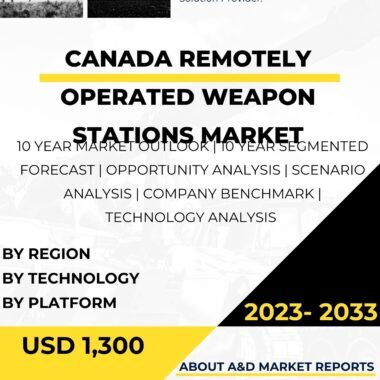Description
The UK defense training and simulator market is a crucial and rapidly evolving sector that plays a pivotal role in enhancing the country’s military readiness, operational effectiveness, and overall combat capabilities. Training and simulators are sophisticated systems that provide realistic and immersive environments for military personnel to hone their skills, practice tactical scenarios, and prepare for a wide range of operational challenges. These training tools are designed to replicate real-world conditions, providing cost-effective and safe alternatives to live exercises while ensuring that military personnel are well-prepared for the complexities of modern warfare.
One of the primary areas of focus in the UK defense training and simulator market is virtual simulation-based training. Virtual training environments employ advanced computer graphics, artificial intelligence (AI), and realistic scenarios to create immersive and interactive training experiences. Military personnel can practice various scenarios, including combat operations, peacekeeping missions, and disaster response, in a risk-free and controlled environment.
Moreover, the UK defense training and simulator market addresses the use of flight simulators for aviation training. Flight simulators are highly advanced systems that replicate the cockpit of military aircraft and provide realistic flight training experiences. Pilots can practice a wide range of flight maneuvers, emergency procedures, and combat scenarios in a safe and controlled environment, reducing the need for costly and risky live flight training.
Furthermore, the defense training and simulator market in the UK encompasses the use of combat simulators for ground forces. Combat simulators replicate battlefield scenarios, allowing soldiers to practice tactical operations, squad maneuvers, and urban combat in a virtual environment. These simulators enhance teamwork, decision-making skills, and situational awareness among military personnel.
The integration of training and simulator systems into the UK’s defense market has also been driven by the need for joint and integrated training. Military operations often involve the coordination of multiple branches and allied nations. Integrated training systems facilitate joint exercises, allowing military units to train together, coordinate tactics, and develop a shared understanding of complex scenarios.
Additionally, the defense training and simulator market in the UK addresses the use of simulators for maritime and submarine training. Naval simulators replicate the bridge of naval vessels and submarine control rooms, providing naval personnel with realistic training experiences in ship handling, navigation, and combat operations.
The UK defense training and simulator market is characterized by continuous innovation and advancements in simulation technologies. Training and simulator systems are becoming increasingly sophisticated, with improved graphics, physics engines, and AI algorithms. The incorporation of AI and machine learning allows simulations to adapt to user behavior, providing personalized training experiences.
Moreover, the defense training and simulator market in the UK is influenced by the integration of virtual reality (VR) and augmented reality (AR) technologies. VR and AR training systems offer highly immersive and interactive experiences, allowing military personnel to train in realistic environments and interact with virtual elements in the real world. These technologies are particularly valuable for enhancing situational awareness, spatial cognition, and complex task training.
The defense training and simulator market in the UK faces several challenges. One significant concern is the need for realistic and high-fidelity training environments. As military operations become more complex and unpredictable, simulations must accurately replicate real-world conditions to provide effective training experiences.
Additionally, the defense training and simulator market must address the challenge of interoperability. As training systems from different manufacturers are integrated into military training programs, ensuring seamless data exchange and interoperability becomes essential for effective joint training exercises.
Moreover, the defense training and simulator market must balance the need for simulation with live training. While simulation-based training offers numerous benefits, live exercises remain crucial for providing hands-on experience and assessing the performance of military personnel and equipment under real-world conditions.
In conclusion, the United Kingdom’s defense training and simulator market is a critical and dynamic sector that contributes to the country’s military readiness and operational effectiveness. Training and simulator systems, including virtual simulation-based training, flight simulators, combat simulators, and maritime training systems, provide realistic and cost-effective environments for military training and preparedness. Continuous research, development, and innovation are vital to address challenges and harness the full potential of training and simulator systems to support and strengthen the UK’s defense capabilities in the future.”




